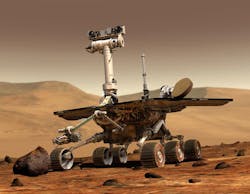Water 2030: Looking into the Future with NASA
Dennis Bushnell is chief scientist for the National Aeronautics and Space Administration (NASA) and is responsible for technical oversight and future programme planning at one of the key research centres, in Virginia, US. In an interview with Paul O’Callaghan, he speaks about what the future holds for global water supplies.
Paul O’Callaghan, chief executive of BlueTech Research (PO): NASA’s involvement in space exploration and aeronautics is well known, but the work you do here on earth less so, can you tell us about it?
Dennis Bushnell (DB), chief scientist, NASA: As well as space exploration and aeronautics NASA is also in the business of trying to determine what humans have done to the atmosphere in terms of pollution and climate change. We invent sensors that we put on satellites and then we archive the data and scientists around the world use these data to determine what is going on. In the process of all this I became interested in how we might grow things on Mars.
That led me to a consideration of how and why we grow things on this planet and that then led me to issues of national security and how well this climate and ecosystem crashing business is going and also how to fix it.
PO: In your work looking at how climate change impacts resource depletion, including water, you have said some of the tactical approaches are moving at snail’s pace. Could you elaborate on that a little?
DB: Well there are two extreme ways to approach a problem, one is to manage scarcity and the other is to create wealth. You are about to have a water forum and I would wager that 90-95% of the papers in discussion will be on managing scarcity as opposed to trying to generate water wealth.
Most of what has been going on in water is about managing scarcity - and there is not much available fresh water. About 97% of water on Earth is saline, but about 70% of fresh water use is for agriculture. So, is there another agriculture that might use saltwater? It turns out there are 10,000 natural halophytes, plants that grow quite well on saline, and there is a huge spectrum of these plants. You can grow food, fodder, biofuel; tubers, berries, greens, and also oils.
The Indian subcontinent has had a brackish water to seawater agriculture on its shorelines for hundreds of years, growing food and fodder very successfully. The next major technology change which will hold off Malthus [population theory] still further and delay the ecosystem problems is halophyte salt plants on wastelands, irrigated with seawater. There are 22 nations around the world which are either investigating or actually applying these halophyte plants.
The Chinese are into this seriously. Perhaps the largest wasteland on the planet is the Sahara, so if you do something simple like plough up the Sahara and irrigate it with the Mediterranean and grow halophytes, you can produce all of the biomass you need to replace all the fossil carbon fuels and to produce all the petrochemical feedstock you need for all the plastics. You can grow a tremendous amount of food and to the extent that you grow food, you then replace the freshwater in conventional agriculture.
We have been working with Boeing on growing halophyte salt plants in the United Arab Emirates for aviation fuel and they seem to be doing quite well with that. We have farms in northern Mexico growing aviation fuel. We have a halophyte operation near Aswan in Egypt to grow food and fodder and also biomass.
There is another way to solve this problem. It involves very cheap energy desalination using low-energy nuclear reactions. This is the old cold fusion business people have been doing experiments in for about 25 years. If it works out, it is going to change the whole energy situation, so you are looking at energy about one-fifth the cost of coal, about one-third to one-fourth of the current cost of renewables, so that is another option but it is just not as near-term as halophytes. The halophytes we can do anytime.
PO: So we’re not resource limited in an absolute sense. It sounds like you believe we have a somewhat myopic view and an addiction to freshwater in the same way we were addicted to readily available cheap oil, whereas in absolute terms there is not a resource scarcity of oil either.
DB: Some 60-70% of all of the new electrical generation on the planet is renewables. Parity of price has dropped to four US cents (¢) per kilowatt hour for solar voltaics and prices as low as 2.3¢/kWh are being contracted for wind; whereas natural gas and coal are up to around 5-6¢/kWh, so people are now going to renewables. Batteries and others ways to store energy are developing very fast, the cost of both storage and renewables is still dropping.
With renewables there are no fuel costs, so if the fossil fuels cost anything at all, this is to their detriment. Coal plants are being closed all over the place and the gas plants that are being built are used primarily as peaking plants. Germany’s found out that the sun is always shining or the wind is always blowing somewhere. Also, with renewables there is no need for so much cooling water, so we are reducing water.
PO: So we could move to a low carbon economy purely based on economics as opposed to anything else?
DB: Oh yes, exactly. I consult for our national security people and we are currently writing an analysis of this as something that is really happening and we are curious as to what it means for world econometrics, for world national security, along with the financial implications.
PO: At the same time with climate change and climate adaptation, is it too late to have any effect on that?
DB: Oh no, that has to be done. There are two major problems, one is climate and energy, and the other is the body ecosystem crashing. In terms of resource consumption, we are currently short by about 50% of a planet; this is well-documented. As the Asians in their billions try to come up to western living standards, we are going to be short three or four planets.
So we need to fix climate and energy, but we also need to fix the ecosystem and go to sustainability. If you go to sustainability and you pay attention to the fact that this is a constrained planet, you cannot do growth.
We have to go to sustainability to fix the ecosystem and no matter what we do, we have to get off CO2. NASA has not yet produced the bulletproof data necessary to include positive feedbacks of climate change in the IPCC report. The positive feedbacks include the effects of the massive amounts of methane coming out of the tundra in the oceans, for example.
PO: You mention the way we are bumping our heads against limits of growth and sustainability and population, but in one sense if you turn your gaze to saltwater we are not limited and if you turn your gaze to renewables there are more exit routes - does it give you cause for optimism that we are not resource constrained in that sense?
DB: At any given time there is a certain population requiring a certain standard of living and a certain share of resources - or they think they do. But there is an issue around the process of wealth accumulation and wealth distribution and as you get extremes of wealth accumulation like is happening now, unpleasant things happen and this will become compounded by the fact that machines will take people’s jobs.
The Arab Spring and the Occupied movement were progenitors of potential social unrest due to various issues including climate change, crashing of the ecosystem and the machines taking the jobs. So I have been looking at what is going to happen.
Firstly, four countries, including Germany and Switzerland, are working seriously at a guaranteed income so you put the machines that are taking the jobs in global commons or you do progressive taxation and you provide some reasonable income for people.
Secondly, we are currently turning humans into cyborgs very rapidly; 10,000 people are walking around with brain chips in their heads. In 15-20 years if you don’t have the latest chip, you probably can’t compete, so as we turn humans into cyborgs they can compete with and join the machines, so we’re changing ourselves. The third approach, which I really like, is that before 1820 or so, in the US, there were very few jobs. Some 94-96% of the workforce were subsistence farmers. Jobs are an artefact of the industrial age, where we ruined the social cohesion in agricultural villages, moved people into cities and learned how to spell alienation. We now have tele-everything - tele-education, tele-medicine. We have 3D-printing, so you can do you can make just about anything you want in your backyard.
There is enough acreage on the planet for the current population to have about six acres; you only need one. On one acre you could make anything you want; you could grow anything you want; you could go off all the grids. No one will need a job and therefore the current econometrics go away.
PO: You mean self-reliant, distributed communities. Could these macro trends affect the water sector?
DB: Oh massively, yes! There’s no reason why people could not do distributed water, where you manage the water at your site. You do cisterns and brief processing. This is what we are doing with distributing generation for electricity. In the US we have 200,000 off-grid homes now.
PO: Do you believe our drinking water treatment plants and our wastewater treatment plants will be operated ultimately by artificial intelligence?
DB: Oh of course, within 10-15 years. There is nothing to stop it. In the US, studies at Oxford University show that within a decade or two, 47% of the jobs would go to the machines. All you need is 5% or 10 % and society is in a really nasty situation. Six or seven years ago, those of us who follow the machine intelligence business thought we would have to wait 10 or 15 years to get decent machine intelligence from brain emulation.
But what happened is IBM combined soft computing neural nets [artificial neural networks] with fast machines and big data. In many areas, this now provides better-than-human intelligence and the number of applications is growing rapidly. Good futurists tell me that the next big thing is X - anything - and add machine intelligence. That’s the next big thing.
PO: What would be your one key piece of advice for professionals in the water/wastewater industry?
DB: Raise your eyes to the horizon and think longer term. We as a species are far too terminally technical. The Chinese I think have a 1,000-year planning cycle, the Japanese 140 years, and the US planning cycle is three months on Wall Street to the four-year presidential cycle. If we really get up against it, in the bio business we are studying extremophiles - things that grow in the harsh vents in Yellowstone and the ocean vents. We could change both plants and people to survive in whatever mess we make. The humans are now in charge of the evolution of everything, including the planet, the people and everything there is.
Paul O’Callaghan is the chief executive of BlueTech Research. Dennis Bushnell, chief scientist at one of NASA’s key research centres, in Hampton, Virginia, US was the keynote speaker at BlueTech Forum 2016.
More Water & WasteWater International Archives Issue Articles




